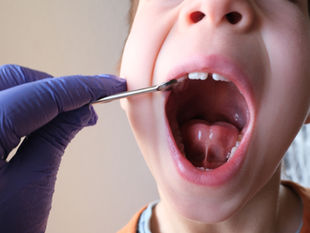Episode 51 of the Airway First podcast is now out! You can catch this and all other episodes on Apple, SoundCloud, Podbean, RSS, Spotify, or wherever you listen to your favorite podcasts. And don't forget to check us out on YouTube!
My guest today is Dr. Lawrence Kotlow a board-certified pediatric dentist — a specialist dedicated to treating children, from birth, infants, and toddlers since 1974. His practice specializes in preventive dentistry, newborn and infant care, the use of lasers for restoring decayed teeth, and oral surgery. His work with mothers and infants with breastfeeding due to tethered oral tissues (tongue-ties and lip-ties) is respected worldwide. His practice, located in Albany, New York, serves the dental needs of all children, including special needs children. He is a recognized international expert and lecturer on the use of lasers in treating children and pediatric dental care.
Dr. Kotlow is well known for his concern and understanding of mothers who wish to breastfeed. He is an internationally known expert on the diagnosis and treatment of abnormally attached lingual frenums, also known as tongue-ties. Dr. Kotlow sees infants as early as a day after birth for the revision of tongue-tie using laser surgery to eliminate the need to place infants in the operating room or the need for drugs for treatment.
Dr. Kotlow has written more than 35 articles and authored chapters on pediatric dentistry and lasers for three laser textbooks. He is also the author of the book SOS 5 TOTS: Exposing the Myths About Breastfeeding and Healing the Heartbreak to Make Breastfeeding a Joy.
You can find out more about Dr. Kotlow at kiddsteeth.com.
Within that first 90 days, if the baby is not getting good oxygenation, they'll have death of cellular nuerons that will never be replaced. ~ Dr. Lawrence Kotlow
Show Notes:
Dr. Kotlow's Office: https://www.kiddsteeth.com/
SOS 4 TOTS Courses: https://www.kiddsteeth.com/sos4tots-courses
SOS 4 TOTS Book: https://shoptbmbooks.com/sos_4_tots.html
Webinar Recording of Airway Health Solutions - Master Class with Dr. Richard Baxter, Dr. Scott Siegel, and Dr. Larry Kotlow: https://youtu.be/z592wRnCXno
Evaluating Your Child For Obstructive Sleep Apnea: PDF
WHAT IS A TONGUE TIE?
A tongue-tie (also called ankyloglossia) occurs when the frenulum band under the tongue fails to separate from the tongue before birth. The band stays connected as the child grows because it's unusually short or thick, creating a tightness to the tongue that limits its mobility.
The ankyloglossia (or tongue tie) can be classified into 4 classes based on Kotlow's assessment as follows:
Class I: Mild ankyloglossia: 12 to 16 mm
Class II: Moderate ankyloglossia: 8 to 11 mm
Class III: Severe ankyloglossia: 3 to 7 mm
Class IV: Complete ankyloglossia: Less than 3 mm.
Not only can a tongue-tie impact a baby's ability to properly breastfeed, but research has also found that it can lead to breathing dysfunctions and sleep issues as children age. Tongue ties can cause several issues including:
breastfeeding challenges and feeding issues with infants
fussy feeding, chewing/swallowing issues, and chronic reflux
speech development, delay, and articulation issues
impacting oral-facial development
mouth breathing, snoring, teeth grinding, and obstructive breathing during sleep
increases in neck pain, shoulder tension, migraines, and chronic headaches
SYMPTOMS AND SIGNS OF TONGUE TIES
Tongue ties are typically diagnosed during a physical exam by a pediatrician or pediatric airway-centric dentist. More and more they are being noticed by myofunctional therapists and lactation consultants. Diagnosis depends on a combination of visual review, infant symptoms, and a feeding assessment.
Signs and symptoms of tongue ties can vary but typically include:
Inability to latch or shallow latching during feeding
Gumming or chewing on the nipple during feeding
Noisy clicking or smacking sounds during feeding (indicating a poor seal)
Colic, reflux, excess gas, or gulping of air
Frequent feedings --- unable to satisfy; poor weight gain
Frequently falling asleep during feeding
Visible frustration with trying to latch or pulling off
Chronic snoring, congestion, or abnormal breathing; chronic mouth breathing
Two-toned lips
Minimal tongue life when crying
Heart-shaped indent or forking of the tip of the tongue
Trouble speaking or licking an ice cream cone in older children
Infants and children with tongue-ties are unable to demonstrate proper oral posture as their tongues are unable to rest on the roof of their mouths when closed.
SPOTLIGHT BOOK RESOURCE FOR PARENTS
“ As a parent who has had two children with tongue and lip ties, and as a clinician who has seen many patients struggling with the effects of both, it’s been hard to find comprehensive, thorough, and easy-to-understand information on tongue and lip ties. This book is an excellent resource for dentists, obstetrician-gynecologists, midwives, lactation consultants, pediatricians, and parents who are looking for more information about how tongue/lip ties affect breastfeeding, speech, dental development, and overall pediatric health. Dr. Kotlow has put it all into one convenient place!”
—Heather Lane, CNM, MSN
Dr. Kotlow, a board-certified specialist in pediatric dentistry, has been serving the needs of infants and children from birth through the early teenage years since 1974. His practice specializes in preventive dentistry, newborn and infant care, the use of lasers for restoring decayed teeth, and oral surgery.
His work with mothers and infants with breastfeeding difficulties due to tethered oral tissues (tongue-ties and lip-ties) is respected worldwide. His practice, located in Albany, New York, serves the dental needs of all children, including special needs children. He is a recognized international expert and lecturer on the use of lasers in treating children and pediatric dental care.









